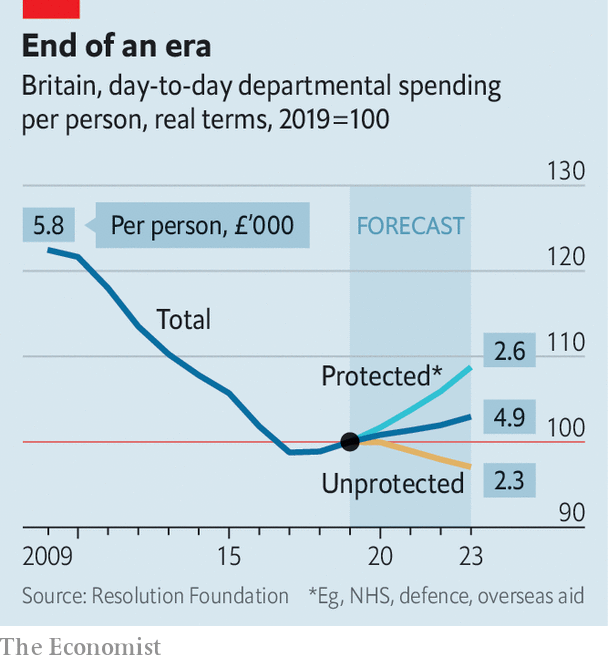
REMINISCING ABOUT budgets of yore, Kenneth Clarke, the Conservative chancellor of the exchequer from 1993 to 1997, recalled how very sensible they used to be. “Politics was different then,” he sighed. “People did not expect the budget would always be popular…even the popular budgets would have things they did not like.” Politics today, in Mr Clarke’s view, is too “short term”. In an era of 24-hour news and instant analysis on social media, politicians are too nervous to propose tough but necessary changes.
On October 29th Philip Hammond, the current Tory chancellor, presented a very modern budget. It had only good stuff in it: big spending rises and juicy tax cuts. Mr Hammond proclaimed three times that fiscal austerity, in place since 2010, was “coming to an end”. And despite all the giveaways, he boasted that the public finances remained healthy. On current forecasts the ratio of public debt to GDP, which rose to 85% after the financial crisis of 2008-09, is now falling. For now, Mr Hammond is all things to all men. But the chancellor cannot forever ignore the big fiscal challenges facing Britain.
Before each budget the Office for Budget Responsibility (OBR), the fiscal watchdog, presents the chancellor with a new set of forecasts. This time Mr Hammond could not believe his luck. Over the financial year Britain will borrow about £10bn ($13bn, or 0.5% of GDP) less than had been forecast in March, possibly because the economy is bigger than forecasters had previously believed. By the end of the OBR’s forecast period, in 2023, the public finances will be some £20bn healthier than expected.
The OBR giveth and taketh away
Mr Hammond could have used this windfall to reduce the budget deficit, with a view to bringing down public debt more quickly. Had he made no changes to policy, the OBR reckons, by 2023 the budget would have been in surplus for the first time since 2000. Instead the chancellor promised the biggest spending boost since at least 2010. The National Health Service (NHS) will get more than £20bn extra per year. Defence will also get a one-off payment of £1bn, spread over the next two years. Having been in steady decline for eight years, overall departmental spending will now grow once again in real terms. By Mr Hammond’s logic, this means that austerity is coming to an end.
The change in tack is motivated more by politics than economics. Many Tory MPs are wavering over whether to support Theresa May, the prime minister, when she presents her hoped-for Brexit deal to Parliament. After a feel-good budget they are less likely to kick up a fuss. Mr Hammond also found enough money to grant the city of Belfast a devolution deal worth £350m, as well as £2m to restore the city centre following a recent fire. That ought to mollify MPs from Northern Ireland’s Democratic Unionist Party, who have threatened to vote down any Brexit deal that erects new trade barriers between the province and the mainland.
The prime minister and the chancellor may also be looking to shore up their position beyond March 29th, when Britain is due to leave the European Union and when some Tory MPs may decide it is time to get a new leader. Talking of the end of austerity is intended to blunt the message of the opposition Labour Party, whose anti-austerity rhetoric has chimed with many Britons. History shows that governments often present giveaway budgets ahead of elections.

However, Mr Hammond’s all-things-to-all-men approach to fiscal policy creates hazards. Declaring the end of austerity is a risky political strategy. Although overall spending is to rise, this is only because of the big dollops of cash given to a few protected departments, chiefly health (see chart). The budgets of other departments, including the Home Office and Ministry of Justice, face more cuts. Stories of rising rough sleeping and out-of-control prisons will not go away. Even with the boost, annual growth in spending on the NHS will remain below its long-run average.
Britain’s worst-off households are particularly unlikely to feel as though austerity is over. True, the minimum wage will rise by 5% in April. In the budget Mr Hammond also put a bit of extra money towards universal credit, a big welfare reform, increasing the amount that a claimant may earn before benefits are withdrawn. Before the budget, universal credit was less generous than the already hard-nosed benefits system it replaced. Now it is probably slightly more so.
Yet £4bn of previously announced welfare cuts are still to come. Most working-age benefits will be frozen in cash terms until 2020. This sits awkwardly with Mr Hammond’s decision to bring forward a rise in the personal allowance for income tax in 2019-20, a giveaway from which the fairly well-off benefit most. The rich got another fillip from the bringing forward of a planned increase in the threshold for the higher rate of income tax (though, as is common practice, these gains were eroded by a corresponding increase in national-insurance contributions for such earners). In all, changes to tax and benefits since 2015 will take a big bite out of the incomes of the poorest households, while slightly raising those of the richest.
There is also a question over how long the good fiscal news will last. When it makes its next forecast, the OBR could quite easily take away much of the fiscal room it has just given. Worse, a “no deal” Brexit could send the economy into a spin. On October 30th S&P Global, a rating agency, warned of a year-long recession if no deal is struck. That would lower the tax take and raise demands on state spending, ultimately making it hard to avoid a return to austerity.
Even with a good Brexit deal, Britain’s fiscal logic is merciless. From the mid-2020s the ratio of pensioners to workers will start to move rapidly in the wrong direction, weighing heavily on the state. Big tax rises will be unavoidable if public services are to maintain their current standards. By then Mr Hammond may be long gone. But whoever is setting Britain’s budget in future years will need to take a leaf out of Mr Clarke’s book.








